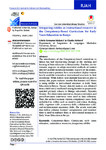Integrating riddles as instructional resource in the Competency-Based Curriculum for Early Years Education in Kenya
Abstract
The introduction of the Competency-based curriculum in
Kenya has had far-reaching changes in the teaching and
learning of basic education in Kenya today. Teachers, are for
instance, required to adopt innovative methods of content
delivery in order to enhance learners’ mastery of the content.
Such innovative practices have seen teachers deploy various
locally available materials as instructional resources in their
classrooms. While riddles have multiple functions to play in
society, this paper analyses benefits that learners will obtain
in using riddles as instructional resources in Early Years
Education in Kenya. Primary data for analysis was obtained
from a field study conducted among learners in purposively
sampled primary schools in Manga sub-county, Nyamira
County. Pre-observation interviews, lesson observation and
post-observation interviews were used in data collection.
Thus, the authors examine various competency-based skills
embedded in riddles such as creative and critical thinking
skills, cognitive skills, numeracy skills, collaborative skills,
and environmental awareness skills. The article concludes
that riddles enhance learners’ competencies and therefore
there is need to embrace them as instructional resources in
Early Years Education in Kenya.
Collections
- School of Education [203]

